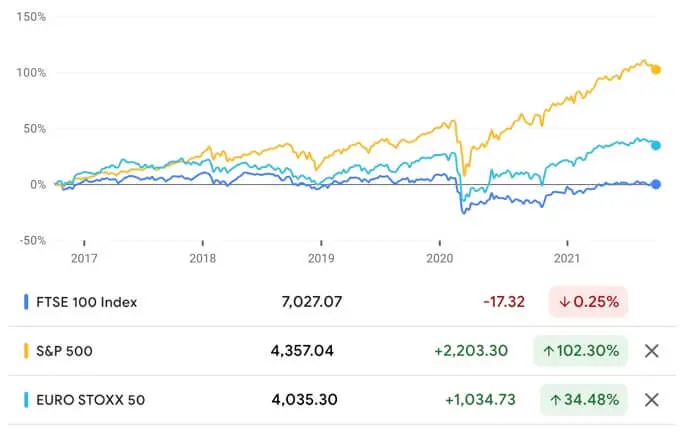
The danger of home country bias and how to avoid it
Home country bias occurs when investors concentrate their portfolios in shares and bonds from their home country.
For example, while the UK stock market now represents only 3.2% of the value of global equity markets (in 2006, it was 10.4%), British investors tend to allocate considerably more than this to UK stocks.
It is a phenomenon that can often be detrimental to investment returns. Especially as the UK has lagged other world markets in recent years.


What causes home country bias?
Whether consciously or not, investors tend to tilt their portfolios towards their home country. This typically happens due to one or more of a number of reasons:
Familiarity
We like to invest in things that we know.
“In investing, what is comfortable is rarely profitable.”
– Rob Arnott, founder and Chairman of Research Affiliates
Perception of risk
Due to factors such as corporate governance, investors perceive foreign investments as more risky than domestic ones.
Currency risk
Fluctuations in exchange rates can impact the return on foreign investments.
Personal experience
I have known clients invest in a company because a friend or family member works there.
They feel that this gives them an insight into the health of the company; we are less likely to have friends/family members working for a company in a country other than our own.
Employer pensions and share ownership plans
Employer pension schemes will typically be weighted heavily towards domestic assets. For example, a UK pension fund will typically invest heavily into UK stocks and bonds.
Then there are employer share ownership schemes. Expatriates often work for a company from our home country. Accumulating stock in them as part of your remuneration package increases your home country bias (the danger of being over exposed to shares in your employer is a subject for another day).
Multinational companies
Some investors rely on investing in domestic companies with a global presence as a means of diversification.
However, while multinational domestic companies do provide exposure to global markets, it is not the same as investing directly into those markets.
In fact, research from Vanguard suggests that the performance of a company’s shares tends to be highly correlated to its domestic market. This is irrespective of where it does most of its business.
Why does it matter?
As mentioned at the outset, home country bias at a minimum can be detrimental to a retirement plan and can often be far more damaging.
In fact, it has been shown that by avoiding broad global diversification, investors are actually increasing their risks.
This is because, in general, individual country markets are much less diversified than the global market.
“The UK FTSE All-Share Index contains 636 companies, with the ten largest accounting for nearly 35% of the index. By comparison, the global index is made up of 14,447 companies, with the top ten making up only 7.9%. The global index also gives you access to companies from 46 different countries.”
– Vanguard UK
The power of diversification
Instead, academic research strongly suggests that the foundation for long term investment growth is a globally diversified portfolio.
For example, in the chart below, the US ranked in the top five for annualised returns over the entire 20 years but finished first in the country rankings just once over that period. In nine calendar years, it was in the lower half of performers.
Meanwhile, in 2017, Austria posted the highest developed markets return but then followed that up with the lowest return the following year.
This just goes to show the power of diversification and not being overly reliant on one particular country (e.g. your home country).
Equity returns of developed markets

There is also the fact that different markets arbitrarily tilt towards different sectors. The U.S. for example has a high weighting towards technology stocks whereas the UK leans more towards financial and “old economy” firms and Canada has a predominance of mining and resource companies.
These sectors do not all move in the same way. If you are biased towards the UK and financial stocks perform poorly, then your portfolio will lag the global market.
It is hard to predict which sector will perform well over any time frame. Simply owning them all will reduce the risk of being overexposed to any one.
What to do about home country bias?
Many investors simply aren’t aware that they are overexposed to their home country.
The first step to solving the issue should be to drill down into the individual funds that you hold, enabling you to identify the underlying assets that are held within.
Once you know the weighting that you have to your home country, you can compare it to your country’s share of the world stock market. This will let you see if it is out of proportion.
The simplest solution if you suffer from this bias is to reinvest across all markets in proportion to their share of the overall world index. A global market-cap-weighted index fund would achieve this.
In doing so, you own the whole haystack instead of searching for the needle within.
“For investors who have a crystal ball, portfolio diversification is unnecessary. For the rest of us a globally diversified portfolio tended to on a regular basis provides an opportunity to better handle the vagaries of volatile markets…”
-Abnormal Returns
Conclusion
By falling foul of home country bias, you may miss out on global opportunities.
For example, if you had invested in a global equity index (MSCI World GBP) over the last decade, you would have earned a return of 13.53% per annum.
By comparison, if you had invested in UK stocks (FTSE 100), then your return would be a fraction of that—just 3.4% per annum.
Putting that into context, if you invested £100,000 and it grew by 13.53% annually for 10 years, it would be worth £355,718. However, if you invested £100,000 and it grew by 3.34% per annum for 10 years, it would be worth £138,894. A difference of £216,824.
With a broadly diversified portfolio, you will reduce both the volatility of your returns and the risk of being overexposed to a specific country or sector—thus allowing you to be more confident in your plans for retirement.
❓ Frequently Asked Questions: Home Country Bias
What is home country bias in investing?
Home country bias refers to the tendency of investors to favour domestic investments over foreign ones, often leading to an under-diversified portfolio.
Why is home country bias considered a mistake?
It can limit growth potential and increase risk because investors are overly exposed to the economic performance of just one country rather than taking advantage of global opportunities.
How can home country bias affect British expats?
British expats may continue to invest heavily in UK assets out of familiarity, missing out on diversification, tax optimisation, or better returns available in their new country of residence or globally.
Is home country bias more common among new or experienced investors?
It affects both, but is particularly common among newer investors or those unfamiliar with international investing and currency exposure.
What are the risks of investing mostly in UK-based funds or stocks?
You risk concentrated exposure to UK market downturns, political instability, or currency fluctuations, all of which can negatively affect your portfolio.
How can I reduce home country bias in my portfolio?
Diversify across sectors, countries, and asset classes. Consider global ETFs or funds, and seek guidance from an adviser who understands international investing.
Does home country bias apply to pensions and ISAs?
Yes. Many UK investors have pensions and ISAs primarily holding UK-based assets. Expats may need to explore international solutions like QROPS or SIPPs to diversify more effectively.
Are there tax implications to investing internationally as a British expat?
Yes, tax treatment can vary by country. Cross-border investing may require expert planning to avoid double taxation and to use appropriate tax-efficient wrappers.
Can currency risk be managed when investing internationally?
Yes. Some funds are currency-hedged, and spreading investments across different currencies can balance out risks over time. Professional advice can help optimise this approach.
Should I work with a financial adviser to overcome home country bias?
Absolutely. A qualified adviser with expat experience can help you build a balanced, international investment strategy that aligns with your goals, residency, and tax position.

Talk to an Expert
Home country bias is one of the most common – and costly – investment habits. Holding too much in one country’s shares, property or currency can quietly increase risk, especially if you’re a British expat whose life and future spending may be spread across more than one country.
I’m Ross Naylor, a UK-qualified Chartered Financial Planner and Pension Transfer Specialist with nearly 30 years’ experience helping clients and expats move from unbalanced, home-biased portfolios to globally diversified, evidence-based investment strategies that better match how and where they actually live.
I firmly believe your location in the world should never be a barrier to expert, impartial and transparent financial advice you can trust.
Whether you’re wondering if you hold too much in UK assets, how to balance UK and overseas markets, how currency risk fits in, or how to diversify without losing sight of your goals, I’ll help you build a calm, rational investment plan that isn’t over-exposed to any single country – including your own.
Book a confidential consultation
